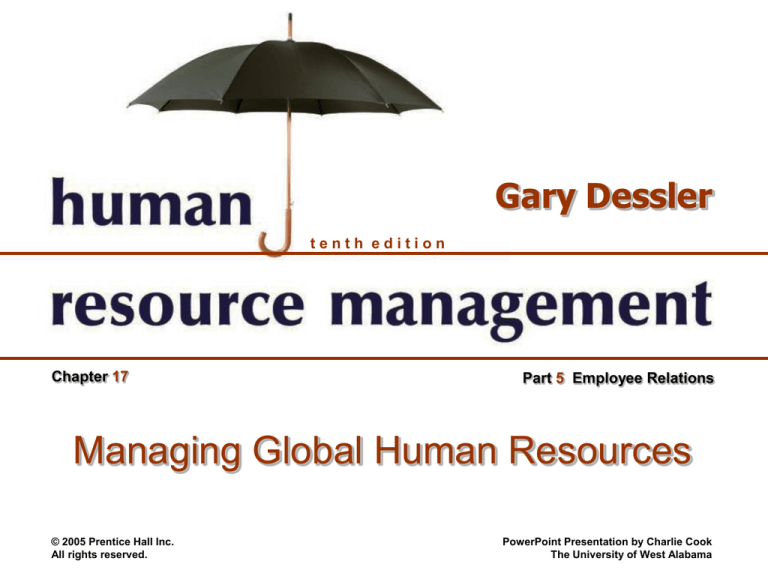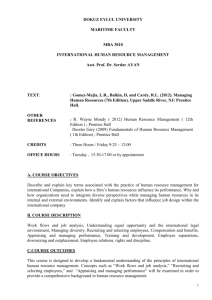
Gary Dessler
tenth edition
Chapter 17
Part 5 Employee Relations
Managing Global Human Resources
© 2005 Prentice Hall Inc.
All rights reserved.
PowerPoint Presentation by Charlie Cook
The University of West Alabama
Why Expatriate Assignments Fail
Personality
Personal intentions
Family pressures
Inability of the spouse to adjust
Inability to cope with larger overseas
responsibility.
Lack of cultural skills
© 2005 Prentice Hall Inc. All rights reserved.
17–2
Helping Expatriate Assignment Succeed
Providing realistic previews of what to expect
Careful screening
Improved orientation
Cultural and language training
Improved benefits packages
© 2005 Prentice Hall Inc. All rights reserved.
17–3
Selecting Expatriate Managers
Adaptability screening
– Assessing the assignee’s (and spouse’s) probable
success in handling the foreign transfer.
– Overseas Assignment Inventory
• A test that identifies the characteristics and attitudes
international assignment candidates should have.
Realistic previews
– The problems to expect in the new job as well as
about the cultural benefits, problems, and
idiosyncrasies of the country.
© 2005 Prentice Hall Inc. All rights reserved.
17–4
I. Job Knowledge
and Motivation
Managerial ability
Organizational ability
Imagination
Creativity
Administrative skills
Alertness
Responsibility
Industriousness
Initiative and energy
High motivation
Frankness
Belief in mission and job
Perseverance
II. Relational Skills
Respect
Courtesy and fact
Display of respect
Kindness
Empathy
Non-judgmentalness
Integrity
Confidence
III. Flexibility/Adaptability
Resourcefulness
Ability to deal with stress
Flexibility
Emotional stability
Willingness to change
Tolerance for ambiguity
Adaptability
Independence
Dependability
Political sensitivity
Positive self-image
IV. Extracultural Openness
Variety of outside interests
Interest in foreign cultures
Openness
Knowledge of local language[s]
Outgoingness and extroversion
Overseas experience
© 2005 Prentice Hall Inc. All rights reserved.
V. Family Situation
Adaptability of spouse
and family
Spouse’s positive opinion
Willingness of spouse to
live abroad
Stable marriage
Five Factors
Important in
International
Assignee
Success,
and Their
Components
Source: Adapted from Arthur Winfred Jr., and Winston Bennett Jr., “The
International Assignee: The Relative Importance of Factors Perceived to
Contribute to Success,” Personnel Psychology 18 (1995), pp. 106–107.
Figure 17–1
17–5
Orienting and Training for
International Assignment
There is little or no systematic selection and
training for assignments overseas.
Training is needed on:
– The impact of cultural differences on business
outcomes.
– How attitudes (both negative and positive) are
formed and how they influence behavior.
– Factual knowledge about the target country.
– Language and adjustment and adaptation skills.
© 2005 Prentice Hall Inc. All rights reserved.
17–6
Trends in Expatriate Training
Rotating assignments that permit overseas managers
to grow professionally.
Management development centers around the world
where executives hone their skills.
Classroom programs provide overseas executives
with educational opportunities similar to stateside
programs.
Continuing, in-country cross-cultural training
Use of returning managers as resources to cultivate
the “global mind-sets” of their home-office staff.
Use of software and the Internet for cross-cultural
training.
© 2005 Prentice Hall Inc. All rights reserved.
17–7
Compensating Expatriates
The “Balance Sheet Approach”
– Home-country groups of expenses—income taxes,
housing, goods and services, and discretionary
expenses—are the focus of attention.
– The employer estimates what each of these four
expenses is in the expatriate’s home country, and
what each will be in the host country.
– The employer then pays any differences such as
additional income taxes or housing expenses.
© 2005 Prentice Hall Inc. All rights reserved.
17–8
The Balance Sheet Approach
(Assumes Base Salary of $80,000)
Table 17–2
© 2005 Prentice Hall Inc. All rights reserved.
17–9
Incentives
Foreign service premiums
– Financial payments over and above regular base
pay, and typically range between 10% and 30% of
base pay.
Hardship allowances
– Payments to compensate expatriates for
exceptionally hard living and working conditions at
certain foreign locations.
Mobility premiums
– Lump-sum payments to reward employees for
moving from one assignment to another.
© 2005 Prentice Hall Inc. All rights reserved.
17–10
Appraising Expatriate Managers
Challenges in appraising oversea managers
– Determining who should appraise the manager.
– Deciding on which factors to base the appraisal.
Improving the expatriate appraisal process
– Stipulate the assignment’s difficulty level, and
adapt the performance criteria to the situation.
– Weigh the evaluation more toward the on-site
manager’s appraisal than toward the home-site
manager’s.
– If the home-office manager does the actual
written appraisal, use a former expatriate from the
same overseas location for advice.
© 2005 Prentice Hall Inc. All rights reserved.
17–11
Differences in International Labor Relations
Centralization
Union structure
Content and scope of
bargaining
Employer organization
Grievance handling
Union recognition
Strikes
Union security
Worker participation
© 2005 Prentice Hall Inc. All rights reserved.
17–12
Terrorism, Safety, and Global HR
Taking protective measures
– Crisis management teams
Kidnapping and ransom (K&R) insurance
– Crisis situations
• Kidnapping: the employee is a hostage until the
employer pays a ransom.
• Extortion: threatening bodily harm.
• Detention: holding an employee without any ransom
demand.
• Threats to property or products unless the employer
makes a payment.
© 2005 Prentice Hall Inc. All rights reserved.
17–13
Repatriation: Problems and Solutions
Problem
– Making sure that the expatriate and his or her
family don’t feel that the company has left them
adrift.
Solutions
– Match the expat and his or her family with a
psychologist trained in repatriation issues.
– Make sure that the employee always feels that he
or she is still “in the loop” with what’s happening
back at the home office.
– Provide formal repatriation services.
© 2005 Prentice Hall Inc. All rights reserved.
17–14
Auditing the HR Function
1. What should HR’s functions be?
2. Participants then rate each of these functions to
answer the question, “How important are each of
these functions?”
3. Next, they answer the question, “How well are each
of the functions performed?”
4. Next, compare (2) and (3) to focus on “What needs
improvement?”
5. Then, top management needs to answer the
question, “Overall, how effectively does the HR
function allocate its resources?
© 2005 Prentice Hall Inc. All rights reserved.
17–15
HR Scorecard
for Hotel Paris
International
Corporation*
Note: *(An abbreviated example showing selected
HR practices and outcomes aimed at implementing
the competitive strategy, “To use superior guest
services to differentiate the Hotel Paris properties
and thus increase the length of stays and the return
rate of guests and thus boost revenues and
profitability”)
Figure 17–2
© 2005 Prentice Hall Inc. All rights reserved.
17–16
Key Terms
codetermination
expatriates (expats)
home-country nationals
third-country nationals
offshoring
ethnocentric
polycentric
geocentric
adaptability screening
foreign service premiums
hardship allowances
mobility premiums
© 2005 Prentice Hall Inc. All rights reserved.
17–17






